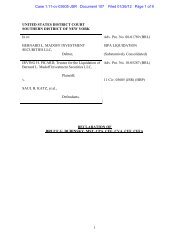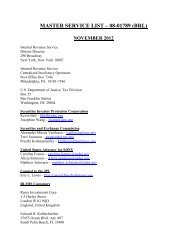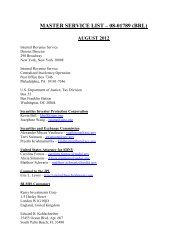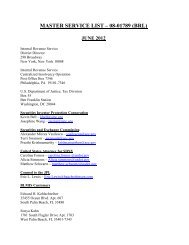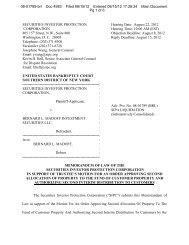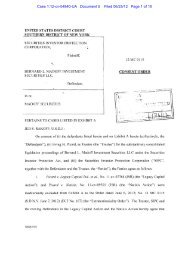BAKER & HOSTETLER LLP 45 Rockefeller Plaza New York, New ...
BAKER & HOSTETLER LLP 45 Rockefeller Plaza New York, New ...
BAKER & HOSTETLER LLP 45 Rockefeller Plaza New York, New ...
Create successful ePaper yourself
Turn your PDF publications into a flip-book with our unique Google optimized e-Paper software.
10-04285-brl Doc 127 Filed 08/17/12 Entered 08/17/12 14:29:55 Main Document<br />
Pg 122 of 133<br />
969 (2d Cir. 1980) (<strong>New</strong>man, J., concurring) (“It will often be quicker and less expensive to<br />
transfer a witness or a document than to transfer a lawsuit.”). As set forth below, the private<br />
interest factors weigh heavily against litigation in Luxembourg.<br />
a. Litigation in the United States Will Involve Greater Access to<br />
Evidence and Lower Costs<br />
(1) Witnesses<br />
The relevant evidence relates to the circumstances surrounding any transfers made from<br />
BLMIS to the Defendants in the six years prior to December 11, 2008. The key witnesses in the<br />
case will be, generally, the Trustee’s expert witnesses and the Defendants. The Trustee<br />
anticipates that most if not all of its experts will be located in <strong>New</strong> <strong>York</strong> and the United States ,<br />
and it obviously will be less burdensome and costly for them to testify in <strong>New</strong> <strong>York</strong>. If this<br />
action were in Luxembourg, however, the court would not allow depositions or cross<br />
examination of these experts or any other witnesses. (Schiltz Decl. 12.) Rather, the judge(s)<br />
would conduct interrogations, posing direct questions to the witnesses. (Id.)<br />
As for the Defendants’ testimony, Luxembourg law prohibits defendants from testifying<br />
under any circumstances. (Id. 11.) Consequently, if the litigation proceeded in Luxembourg,<br />
the Trustee would be unable to obtain testimony from any individual Defendant or from any<br />
director, officer, or employee acting on behalf of Defendant entities. (Id.) This Court, however,<br />
has the power to compel testimony from the defendants and/or individuals within the<br />
Defendants’ control. See, e.g., Doe v. Hyland Therapeutics Div., 807 F. Supp. 1117, 1125<br />
(S.D.N.Y. 1992) (“[M]uch of the evidence, in the form of documents and witnesses . . . is apt to<br />
be within defendants’ control, rather than that of third parties. Such evidence consequently will<br />
be subject to the compulsory process of whatever court hears this controversy.” (internal citation<br />
omitted)). Further, it would not be unduly burdensome for the defendants—who willingly<br />
102



